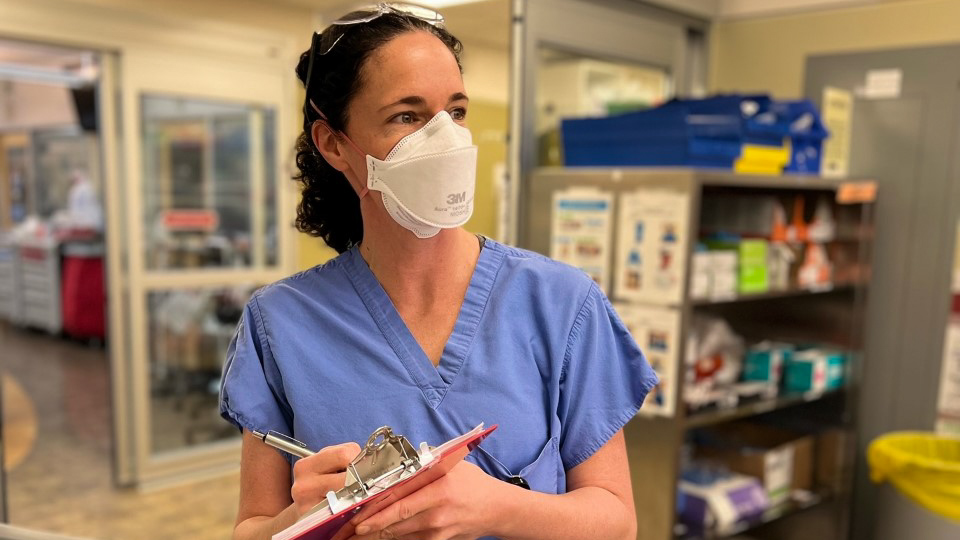ER workers say they’re ‘overwhelmed’ and ‘distressed’
'We simply cannot give patients the care they deserve,' says Halifax Infirmary emergency physician

caption
Dr. Lorri Beatty marks her chart while working in the emergency department of the IWK hospital.Peter Hičo, a paramedic for the Capital District Health Authority, was feeling extreme “moral fatigue” while at the Halifax Infirmary on Feb. 13.
Hičo said a person with a significant spinal condition left the emergency department after waiting six hours.
“I just don’t have space for them. I don’t have time for them,” he said, of similar situations.
“They are just leaving and you know it’s awfully wrong, but there is nothing you can do.” Related stories
CTV reported in October that Canadian Institute for Health Information data showed 1.3 million Canadians left an emergency room in 2023 without receiving care.
A lack of beds and practitioners
Dr. Collin Audain, head of Doctors Nova Scotia, describes the condition of emergency departments as the “canary in the coal mine” with respect to health care.
“The emergency department is the frontline of everything in the health-care system,” he said. It becomes the first place to go when you need to see a physician immediately. For those without a primary-care physician, it can be their only option for care.
The Canadian Institute for Health Information announced in August the number of unscheduled emergency department visits rose to more than 15.1 million in 2022–2023, up from almost 14.0 million in 2021–2022.
Dr. Audain said there is a shortage of primary-care providers, with 15 per cent of Nova Scotians not having a primary-care physician, causing “suffering” within the emergency department.
“The current solutions to these problems, from the current government and health authority, are years away,” said Dr. Audain. Like the medical campus being built in Cape Breton for example, which he said is “five to seven years away.”
However, Dr. Neil Petrie, emergency physician at the Halifax Infirmary, said, “It’s not that there are too few practitioners. It’s that there are too few rooms.”
Dr. Petrie said he is seeing patients deteriorate and die in the hallways and waiting rooms.
The province has made efforts to address the situation. It is in the design stage of building a new $3 billion hospital in Halifax, which will include a new emergency department. In December 2022 it announced it would build a new emergency department at the Dartmouth General Hospital. In January 2023, it announced more action toward improving emergency care.
“The health-care system was built during a different era and aside from technological advances, it has barely changed since,” stated Karen Oldfield, president and CEO of Nova Scotia Health, in a news release at the time. She pledged to build a hospital system that was “ready, responsive and reliable.”
Moral fatigue and injury
However, Dr. Lorri Beatty, emergency physician at the Halifax Infirmary, said, “We simply cannot give patients the care that they deserve. Seeing unnecessary suffering causes a lot of distress.”
Hičo said moral fatigue or moral injury pertains to “when you know you should be doing something, but you aren’t doing it.”
This is usually caused by limitations of the system or reasons out of their own control, whether there are not enough beds, or few too practitioners.
“We know we need timely treatment for certain things, and we’re failing it,” he said.
The Canadian Medical Association describes “moral injury” as the psychological distress that results from events that go against one’s values and moral beliefs.
Dr. Beatty and Dr. Petrie said physicians working fewer shifts in the emergency department and choosing to work in other departments is a major issue, causing it to become “overwhelmed.”
Dr. Matt Clarke, associate chief medical information officer for Nova Scotia Health and emergency physician at the Halifax infirmary, said emergency departments have always dealt with high turnover rates and moral injury issues. He said it is about finding the right “coping mechanisms.”
“More and more doctors are splitting their time between the emergency department and elsewhere, finding alternative initiatives to be involved in,” he said.
Dr. Clarke sees this as a potentially positive solution.
“In the past, all of my work was clinical. Now, I have changed to about 50/50 between the emergency department and my other roles,” he said.
“I’ve noticed significant improvement on how I feel on a shift. Significantly less moral injury, burnout or compassion fatigue and have experienced much more value and satisfaction.”
However, Hičo does not see this as a viable solution as there are simply not enough physicians working the emergency department. He emphasizes the need for “moral hardening.”
“Every single one of the staff I have worked with, besides a few cheerful exceptions, build barriers between themselves and their work when patients come into the emergency setting,” he said.
A need for change
The current system is described by Dr. Petrie as “provider-centred care” rather than focusing on the patient. This means the rules, regulations and scheduling policies are often set up to make life easier for the physician rather than what is most helpful for the patient.
Dr. Beatty said this allows other departments outside emergency to shut their doors to patients, causing even more overcrowding in the emergency department.
“It is tricky when you are working 24 hours per day, every day, trying to interact with a system that, for the most part, works bankers’ hours.”
Beatty and Petrie believe a switch to patient-centred care in all areas of health care, meaning increased access and continuity of care, is what’s needed.
Correction:
About the author
Cam Kinley
Cam is an aspiring video journalist from Toronto, ON with a special interest in sports media and broadcasting. He currently works for the Canadian...
